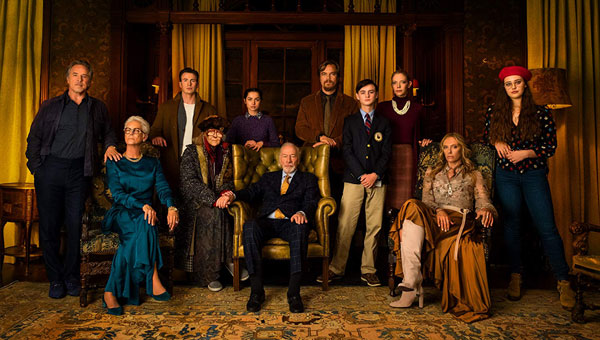Knives Out Review

I always get a little nervous when it comes to big-screen ensemble-cast murder mysteries.
My favourites were always the one-hour Poirot episodes on ITV on Sunday nights, back in the early nineties when I was kid.
Apart from the show’s regular cast, the weekly guest stars looked only vaguely familiar, which added to the sense of mystery.
Jump to present day, and Kenneth Brannagh’s version of Murder on the Orient Express was populated with all sorts of famous faces, from Johnny Depp and Michelle Pfeiffer to Judi Dench and Willem Dafoe.
The film was successful enough to warrant a sequel, and it certainly wasn’t the first film to adapt a classic whodunit with a big-name cast. In fact, it wasn’t even the first big-name adaptation of this story.
It didn’t work for me however; I already knew the plot well alongside most of the target audience, but personally still felt that the sense of celebrity distracted from the story.
My understandable apprehension in approaching Rian Johnson’s new film, Knives Out, was fortunately unfounded.
The film focuses on the investigation into the death of famed novelist Harlan Thrombey (Christopher Plummer), who is found on the morning after his eighty-fifth birthday party with his throat slit.
Harlan’s family, who all attended the party and are all dependent on him in one way or another, quickly become suspects and are interviewed by the police and eccentric sleuth Benoit Blanc (Daniel Craig, with outrageous Southern drawl).
We largely witness events through the eyes of Marta Cabrera (Ana de Armas), Harlan’s shy nurse and caretaker, who becomes a Watson of sorts to Blanc’s Sherlock. Not my words; his.
As the story unfolds, revelations and twists are undermined by subsequent revelations and twists, and nothing is what it seems.
Johnson seemed to have set out to create an Agatha Christie-esque mystery, and like the aforementioned fare, there is a big name cast here, including Jamie Lee Curtis, Craig and Chris Evans. It is pleasing to note how Johnson has coaxed such strong performances from each of his cast to overshadow all sense of familiarity.
The cast is uniformly great, effortlessly adding weight to standard murder mystery archetypes, but special mention goes to De Armas as the story’s moral centre, and Craig, whose initially cartoonish turn leaves you rooting for a Benoit Blanc franchise by the end of the film.
The structure works well too: we first meet the characters as they are interviewed one by one, neatly establishing who they are and how they fit in, before gathering them together in the second act for the will-reading, watching sparks fly as they interact.
Overlaying all the character work is an intriguing mystery which periodically, though pleasantly, wrong-foots the audience.
As I watched Knives Out, I remembered how Johnson’s first feature film was Brick, a high-school-set detective story, and in his latest film, Johnson’s love for the genre shines through once more.
Knives Out is a big-name murder mystery which I am happy to say adds up to more than the sum of its parts.
Conor Brennan